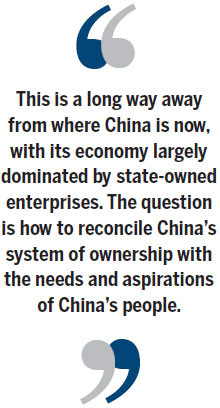China has a future as a high-income country
Updated: 2014-07-11 07:25
By Giles Chance (China Daily Europe)
|
|||||||||||
Economic changes could lead to a comfortable life for over half the population in 30 years
News that a recalculation by the International Monetary Fund of prices in emerging countries makes China a larger economy by next year (after adjusting for local prices) than the United States has stirred up the Western media.
Much of their comment has emphasized the significance of market prices, as against measures based on purchasing power, when drawing international wealth comparisons between countries. China itself has pointed out that it remains a poor country, with at least half of its people still in poverty or close to it, only qualifying for the "largest economy" description because it has such a large population - nearly one-fifth of all the people in the world.

Undoubtedly, China's comment is true, and a "national-income-per-person" measure, like the World Bank's "low-income", "medium-income" or "high-income" would account much better for China's large population, and is therefore a much better reflection of China's true standing in terms of national wealth.
But here, too, China scores well. Since 1995, China's annual per capita income has increased much faster than the US annual average increase of 3.5 percent. Last year, China was recorded by the IMF as having gross national income per person of $6,747 (4,957 euros), placing it firmly in the upper middle-income group of countries along with other key emerging countries such as South Africa, Brazil, Turkey and Mexico. Starting this year, China needs to continue growing its per capita average income at 8 percent, in US dollar terms, every year for it to reach the Chinese government's goal of becoming a high-income country by 2020.
China's economic momentum and potential make such an achievement possible. Perhaps half of China's population, in central and western China, is only just beginning to enjoy some disposable income. Most of these people still do not own a car or an apartment. China's enormous pent-up spending power will drive the economy forward to achieve high-income status, which was considered by the World Bank last year as being an income per capita level of $12,616 in purchasing power terms.
A more difficult question is whether China as a country can ever achieve the economic status of countries like Portugal and Greece or Uruguay and Chile, not to mention Italy, Spain or even Canada. For this to happen, China cannot rely on natural resources like copper, as in the case of Chile or Canada, or agriculture, as in the case of Uruguay. It has to become a different kind of economy, with high labor productivity driving higher wages and strong consumption growth, with services like banking and media playing a much bigger role in economic growth than consumer products.

This is a long way away from where China is now, with its economy largely dominated by state-owned enterprises. The question is how to reconcile China's system of ownership with the needs and aspirations of its people. On the one hand, China's traditionalists today have the satisfaction of knowing that all the strategic elements of China's economy, from banking to energy production, remain in the hands of the state. On the other, such a wasteful and unproductive system can never allow China to reach its economic potential.
It's safe to say that China, which has moved a long way in both economic and political terms since 1980, needs a few more years, or even decades, before this economic-political dilemma can be resolved in a balanced way that satisfies the majority of the Chinese people. Deng Xiaopeng's aphorism of "crossing the river by feeling the stones" has served China well in the last 35 years. Deng's sayings are just as relevant to today's and tomorrow's Chinese development issues as they were when China was contemplating opening up its coastal provinces to foreign trade in the 1970s.
China's ascent to wealthy-country status requires a change in China's development model as great as any of the changes China has made since 1980. Even with those changes, large areas of China in the far west, far north and far southwest may never participate in the country's status as a wealthy country. These distant regions could remain deprived, and may have to rely on assistance from the richer eastern and central provinces permanently.
Yet, it is still possible to conceive of a China in 30 years in which more than half the population lives a comfortable life, in which the basic necessities of life are easily met, while some regions in the south and east achieve levels of prosperity that compare with or even exceed those of rich developed countries today. This may not be the same overall wealth level as in the United States or richer western European countries such as Norway or Switzerland. But it still would be a huge change from today, and is an achievable goal that would represent a remarkable achievement by the Chinese people.
The author is a visiting professor at Guanghua School of Management, Peking University. The views do not necessarily reflect those of China Daily.
(China Daily European Weekly 07/11/2014 page13)
Today's Top News
Germany wins World Cup on Gotze's brilliance
German suspect was not in contact with spies: US
Xi makes 'symbolic' stop in Greece
Baidu big winner in World Cup
Luxury car sales accelerate
Pianist Lang is on his game in Rio
School helps HIV students
$2.9 billion in gambling assets seized
Hot Topics
Lunar probe , China growth forecasts, Emission rules get tougher, China seen through 'colored lens', International board,
Editor's Picks

|

|

|

|

|

|





